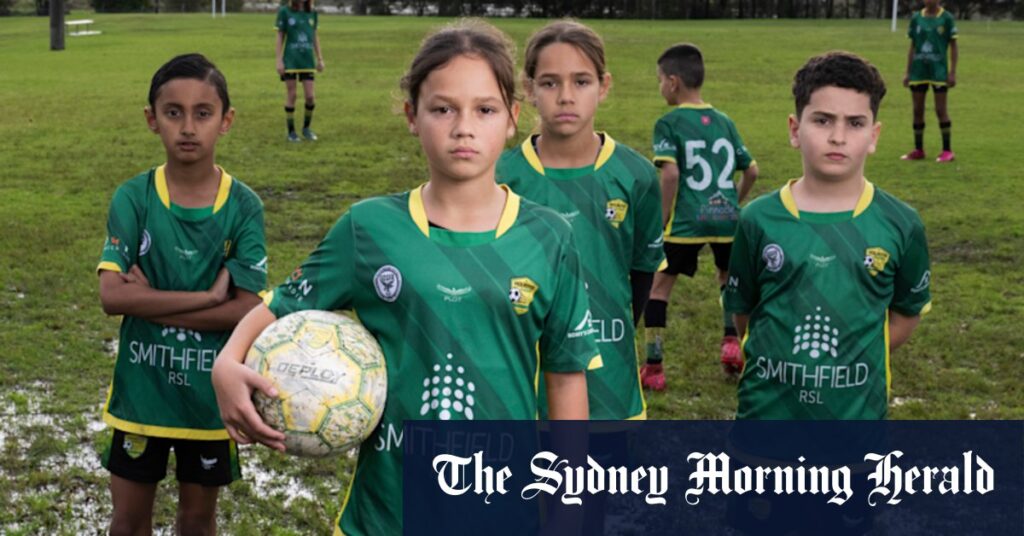I was most alarmed to read that at least two Sydney councils are intending to build more synthetic playing fields (“Wet weather reignites sports’ turf wars”, August 24). How is this happening with all we now know about microplastics and nanoplastics in the environment? There is a strong need for regulation in this area. This is why we urgently need the long-overdue government response to the report recommendations from the government’s own inquiry into plastic pollution in oceans and waterways. Jill Robinson, Randwick
Holroyd Rangers players Mahalia and Rhyder Hall at the soaked Guildford field.Credit: Janie Barrett
According to Ryde Council, synthetic turf fields are reliable and accessible. Prophetically so true. You can rely on them to shed rubber and plastic fragments into any accessible waterway. The world’s oceans, marine life, the air we breathe and the water we drink are groaning under increasing presence of these contaminates. Come on, sport, let’s not add to this plastic penalty we’re passing on to future players. Steve Dillon, Thirroul
Trying to fix the problem of soggy playing fields with synthetic turf is just a Band-Aid solution on a larger scale. The heat and plastic pollution, along with run-off and other environmental effects, will only land us in more trouble of different sorts in the long term. Frustrating as it is, rain is a fact of life that we couldn’t live without. When it comes in lengthy stretches it’s best to stay inside and find something creative to do while we wait it out. Meredith Williams, Baulkham Hills
One extraordinarily wet winter’s month and people are demanding more synthetic fields. I can’t wait until we have a very hot summer and the same whining parents will be demanding more grass fields because the synthetic ones are too hot for their precious children. Here’s an idea; if sport is washed out, go home and read a book. Peter Miniutti, Ashbury
Gary Feeney (Letters, August 24) and others in the eastern states may be interested to learn that single-use plastic-lined coffee cups and plastic lids have been banned in Western Australia for over a year. Lesley Walker, Northcote (Vic)
NDIS struggles
Thank you, Kate Kricker, for sharing your story, a personal insight into a system “designed” with a view to encompass a broad and highly diverse cohort, yet one clearly riddled with inequality (“NDIS with autistic boys has been a nightmare”, August 24). The experience you shared around the onus being on the parents to access specialist support is mirrored by countless others. If the minister and his advisers took the time to engage with recipients to hear their stories, it would go a long way to improving the delivery of critical professional support, regardless of post code and social status. Allan Gibson, Cherrybrook

Autistic children are to be moved off the National Disability Insurance Scheme.
Playing with fire
I agree with your editorial: input from emergency services is very important when housing is planned (“Input from emergency services is most important when housing is planned”, August 24). Our place in a bushfire-prone region suddenly had a house spring up in the bush next door, above a steep-sided gully prone to updraught flames. Oddly, the owners rang Fire and Rescue NSW to try and force us to clear-fell our block (didn’t have to), but the firemen asked “what fool” had approved the new house because it was in a fire zone and they had not been consulted. When the local council was rung, the responder checked and agreed that no planning permission had been granted. Within a few hours, a call to us claimed that planning permission had been given to this person, who had close business with the council. Nothing like retrospective approval. Donald Hawes, Peel
What is the point in allowing development in flood- and bushfire-prone areas if the housing ends up destroyed and creates more housing crises? (“How new planning rules could stop emergency services blocking housing”, August 24). Has the government learnt nothing from the 1994 Sydney bushfires, the 2013 state mines bushfires or the 2022 Northern Rivers floods, the last of which contributed significantly to the current housing crisis in that area? Gina Hay, Bayview
Bad old days
I suspect Jacqueline Maley might better understand the outrage at the debate on women returning to the kitchen if she were my age (over 70) (“Baking mad or the convo we need?”, August 24). She might then understand the deep dismay we feel with over the rerun of a debate we had so many times over so many years. It was adjudicated. We won. Women got to choose, in Australia at least. Don’t encourage the men who would like to turn back time. Jennifer Briggs, Kilaben Bay
If “tradwives” take Anne Boleyn as their model “because she was powerful”, according to the source quoted by Jacqueline Maley, should we also see Henry VIII as the ultimate feminist champion?
Jenifer Nicholls, Windsor (Vic)
Trump circus rolls on
Against the background of fading peace hopes both in Ukraine and the Middle East, and as famine is declared in Gaza, the Trump MAGA machine continues to power on with diversions (“FBI search the home and office of Trump critic”, August 24). He had made no secret of his desire to take control of the US Justice Department and therefore exert his influence on all its constituent agencies. This raid on one of his former trusted advisers, now a political enemy, signals yet another smokescreen. This TV-ready event is part of a circus train which also includes Jeffrey Epstein’s imprisoned former girlfriend’s testimony that in her eyes Trump did “nothing inappropriate”. What next, a pardon? Allan Gibson, Cherrybrook
- To submit a letter to the Sydney Morning Herald, email letters@smh.com.au. Click here for tips on how to submit letters.
- The Opinion newsletter is a weekly wrap of views that will challenge, champion and inform. Sign up here.
Read the full article here

